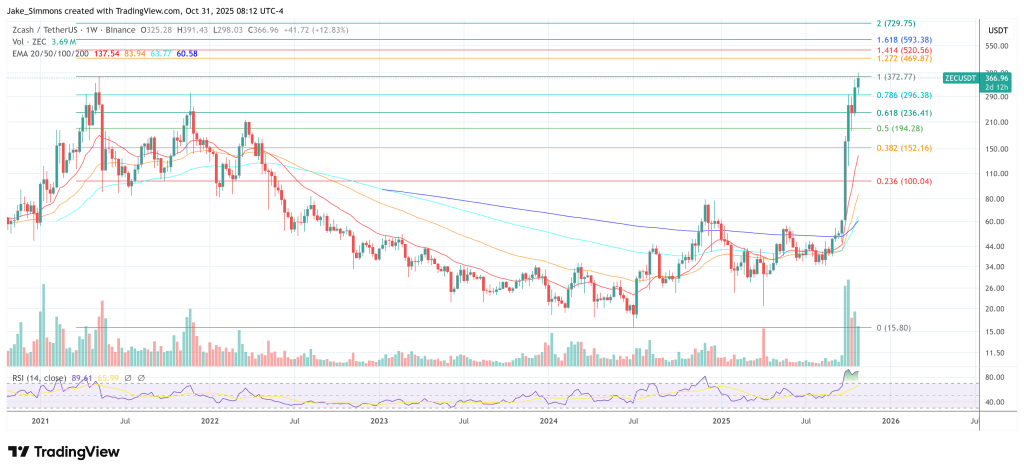Is Zcash Quantum-Resistant Yet? Experts Weigh In
A debate on X this week exposed a core question for on-chain privacy: when quantum computers are able to break elliptic-curve cryptography (ECC), will they be able to retroactively deanonymize every transaction ever made of privacy coins like Zcash?
Nic Carter, co-founder of Coin Metrics and partner at Castle Island Ventures, argued that the answer is effectively yes for most privacy coins. “For privacy coins, even if they migrate to post-quantum cryptographic schemes, all historical transactions prior to that migration can be decrypted,” he said on October 30, 2025. “So all historical txns will be stripped of privacy in >~5y. Everything is built on ECC.”
Carter’s point is based on “harvest now, decrypt later.” Attackers don’t need to break you today. They just copy the data now and crack it once quantum is strong enough. On blockchains, that problem is worse because the data is already public and permanent. “Blockchains are uniquely bad for quantum because normally the quantum thing is ‘harvest now decrypt later’ so adversaries have to be preemptively harvesting traffic but blockchains just.. publish.. everything.. forever.”
He warned specifically that even if a privacy coin upgrades to quantum-resistant signatures in the future, old activity is still exposed once ECC falls. “While privacy coins can adopt post quantum sigs, understand that all previously hidden addresses, relationships between addresses, etc, will be revealed once ECC is broken,” Carter said. “And obviously everything is on chain so you don’t even need to harvest traffic today.”
Is Zcash Already Quantum-Resistant?
That claim triggered pushback from Zcash supporters, who argue Zcash is structurally different from something like Monero.
Mert Mumtaz (Helius) agreed that Carter’s warning applies to “many privacy coins like Monero,” but said it’s “not necessarily true for zcash’s privacy, given advanced opsec.” He acknowledged that “advanced opsec is not the norm,” but said that if it is followed, Zcash users “get you certain guarantees w.r.t information leakage.” He also said “some things are in the works to make this even stronger,” pointing to research by Zcash engineer Sean Bowe.
Bowe’s position is that Zcash’s fully shielded pool simply does not put critical sender/receiver information on the ledger in the first place. “There is no quantum computer or powerful AI that will be able to look back at the Zcash blockchain 1000 years from now and figure out who made every fully shielded transaction,” Bowe said in July this year. “That information, among other things, never even touches the ledger. It’s already gone.” His condition is clear: “To be certain about your privacy you must start by using shielded Zcash. You almost cannot even begin otherwise.”
Carter partially credits that. “Zec is definitely ahead of anyone when it comes to quantum preparedness, not denying that,” he said. But he called the “already quantum-proof” framing unrealistic in practice.
He argued that Zcash’s long-term privacy story depends on very strong assumptions that often break in the real world: “assumes pubkey never being known. assumes: no metadata collection, no exchange key leaks, perfect metadata privacy.”
He added that Zcash’s shielded pools — Sprout, Sapling, Orchard — still “rely on ECC for key exchange, viewkeys, proof verification, which are all broken” under a powerful quantum adversary. His conclusion: “unrealistic to say zec privacy is perfectly q resistant. linkages between addrs are forever encoded on the blockchain, you and Sean know that. store now decrypt later still applies.”
In other words: Zcash builders say that if you stay fully shielded, the chain itself won’t hand quantum attackers a clean map of who paid whom. Carter says that in the real world, users leak, exchanges leak, metadata leaks — and once ECC breaks, those leaks plus the permanent ledger are enough to unwind the privacy anyway.
One final note: when asked directly, Carter denied holding ZEC. “Nope.”
At press time, ZEC traded at $366.

You May Also Like

Cleaning Up Crypto ATMs Isn’t Anti-Crypto

Incremental Learning: Comparing Methods for Catastrophic Forgetting and Model Promotion
